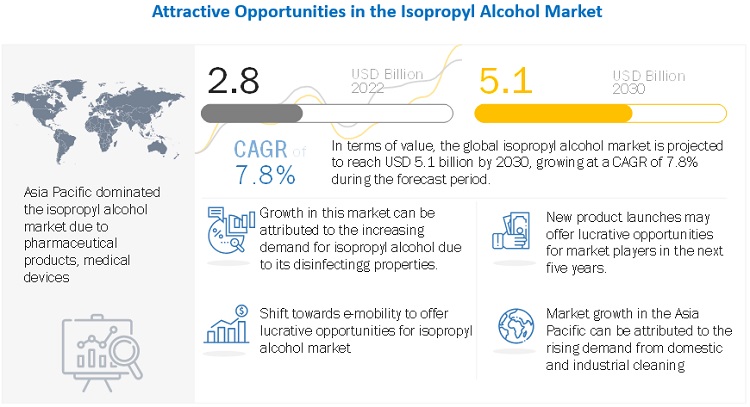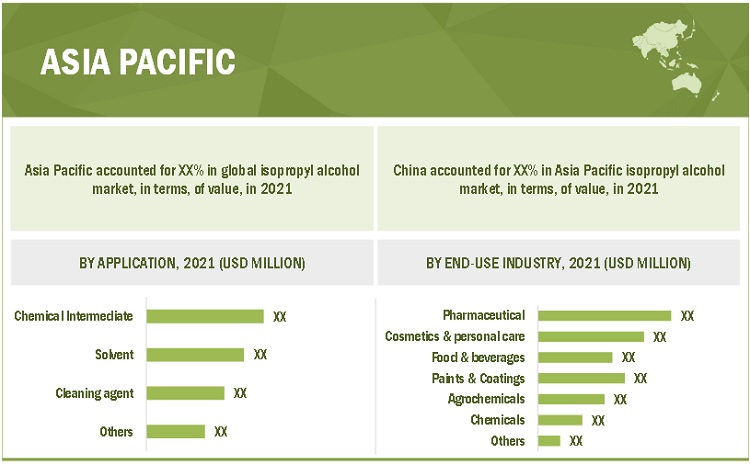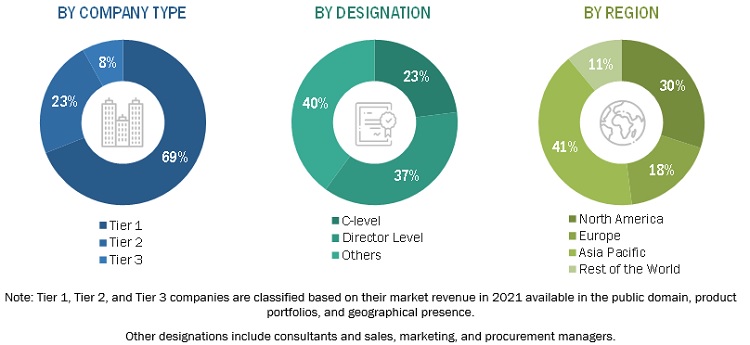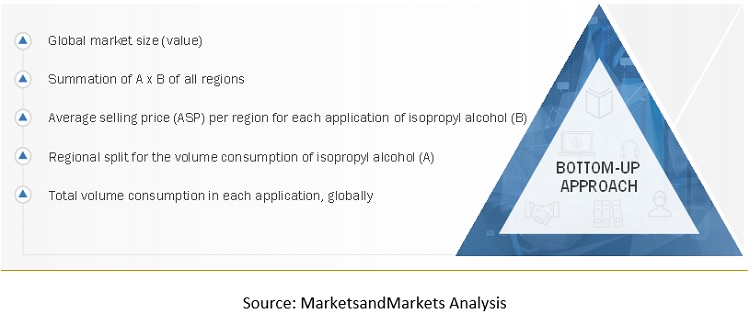Isopropyl Alcohol Market by Application (Antiseptic & Astringent, Cleaning Agent, Solvent, Chemical Intermediate), End-use Industry (Cosmetics & personal care, Pharmaceutical, Food & beverages, Agrochemicals, Paints & coatings, Chemical, and Others), and Region - Global Forecast to 2030
The isopropyl alcohol market is projected to reach USD 5.1 billion by 2030, at a CAGR of 7.8% from USD 2.8 billion in 2022. Isopropyl alcohol (IPA) exhibits excellent solvency characteristics and is therefore recognized as one of the key solvents across end-use industries. The substance is also a key component used across several medical facilities, pharmaceutical products, medical devices, mainly due to its disinfectant properties.

To know about the assumptions considered for the study, Request for Free Sample Report
Market Dynamics
Driver: Increasing incomes, population growth, rapid urbanization, economic growth, and changes in the lifestyle of the consumers to drive the market
Increasing disposable incomes, population growth, rapid urbanization, economic growth, and changes in the lifestyle of the consumers are the factors that drive the Isopropyl Alcohol Market positively. These factors catalyze the growth of various downstream industries like pharmaceuticals, paints & coatings, automotive and cosmetic industry which increases the demand for isopropyl alcohol market during the forecast period.
Restraints: High energy costs, corrosive conditions, and pollution problems to pose as a threat for market growth
High energy costs, corrosive conditions, and pollution problems are the major restraints of the Isopropyl Alcohol Market. To overcome these problems, the advanced more efficient technique called catalytic hydrogenation of acetone is used.
Opportunities: Advanced technologies can drive the growth of market
The advanced technologies in the production empower the industry with higher yield rates and production of high-purity grades which allows increasing the growth of the Isopropyl Alcohol Market.
Challenges: Health concerns to pose as a challenge
Health concerns occur when it is exposed due to its highly flammable and strong odor nature.
“Antiseptic and astringent were the largest type of Isopropyl alcohol market in 2021, in terms of value”
Antiseptic and astringent held the largest share. The recent pandemic in 2020 has resulted in rapidly growing demand for the product as an astringent and antiseptic. The outbreak of virus shall directly lead to regular consumption of sanitizers, personal care products, and other pharmaceutical formulations to maintain personal hygiene worldwide. This is projected to reflect high demand in pharmaceutical as well as personal care product formulation.
“Pharmaceutical was the largest end-use industry for isopropyl alcohol market in 2021, in terms of value”
The pharmaceutical segment held the largest share in 2021. Proven the high ethanol content in isopropyl alcohol, it has widespread applications across a multitude of industries. Demand for the chemical is growing rapidly from the pharmaceutical sector, personal care and cosmetics, chemicals, food and beverages, and paints and coatings industries worldwide. The personal care segment is likely to grow rapidly post the virus outbreak in the first quarter of 2020.
“Asia Pacific was the largest market for Isopropyl alcohol in 2021, in terms of value.”
The regional movement of isopropyl alcohol is likely to depend on the recent industry trends and economic upturn of countries, post the coronavirus epidemic. In 2018, the U.S., followed by Western Europe and China respectively, were the leading consumers of the product. However, provided the current global scenario, Europe has recorded the highest consumption of sanitizers and personal hygiene products, followed by the U.S. and China. Major capacity additions occurred in the European countries, especially in Germany, to contain the 2020 virus outbreak.

To know about the assumptions considered for the study, download the pdf brochure
Key Market Players
The key players in this market are Dow Inc. (US), LyondellBasell Industries N.V. (US), Linde plc (UK), Ecolab Inc. (US), ExxonMobil Corporation (US), Shell USA, Inc. (US), INEOS Group Ltd (UK), Mitsubishi Chemical Holdings Corporation (Japan), Tokuyama Corporation (Japan) and LG Chem (South Korea). Continuous developments in the market—including new product launches, mergers & acquisitions, agreements, and expansions—are expected to help the market grow. Leading manufacturers of isopropyl alcohol have opted for new product launches to sustain their market position.
Scope of the Report
|
Report Metric |
Details |
|
Years considered for the study |
2017-2030 |
|
Base Year |
2021 |
|
Forecast period |
2022–2030 |
|
Units considered |
Volume (Kiloton); Value (USD Million) |
|
Segments |
Application, End-use Industry, and Region |
|
Regions |
Asia Pacific, North America, Europe, Middle East & Africa, and South America |
|
Companies |
Dow Inc. (US), LyondellBasell Industries N.V. (US), Linde plc (UK), Ecolab Inc. (US), ExxonMobil Corporation (US), Shell USA, Inc. (US), INEOS Group Ltd (UK), Mitsubishi Chemical Holdings Corporation (Japan), Tokuyama Corporation (Japan) and LG Chem (South Korea) |
This report categorizes the global isopropyl alcohol market based on application, end-use industry, and region.
On the basis of application, the isopropyl alcohol market has been segmented as follows:
- Antiseptic & astringent
- Cleaning agent
- Solvent
- Chemical intermediate
- Others
On the basis of end-use industry, the isopropyl alcohol market has been segmented as follows:
- Cosmetics & personal care
- Pharmaceutical
- Food & beverages
- Agrochemicals
- Paints & coatings
- Chemical
- Others
On the basis of region, the isopropyl alcohol market has been segmented as follows:
- Asia Pacific
- Europe
- North America
- Middle East & Africa
- South America
Frequently Asked Questions (FAQ):
What is the expected growth rate of isopropyl alcohol market?
The isopropyl alcohol market is projected to reach USD 5.1 billion by 2030, at a CAGR of 7.8% from USD 2.8 billion in 2022.
Who are the major key players in isopropyl alcohol market?
Dow Inc. (US), LyondellBasell Industries N.V. (US), Linde plc (UK), Ecolab Inc. (US), ExxonMobil Corporation (US), Shell USA, Inc. (US), INEOS Group Ltd (UK), Mitsubishi Chemical Holdings Corporation (Japan), Tokuyama Corporation (Japan) and LG Chem (South Korea).
What is the average selling price trend for isopropyl alcohol market?
Prices are low in Asian countries (primarily China and India) compared to those in Europe and North America due to the low prices of raw materials and the availability of low-cost workforces in Asia Pacific. .
To speak to our analyst for a discussion on the above findings, click Speak to Analyst

Table of content
1 Introduction
1.1 Objective of the study
1.2 Market definition
1.3 Market Scope
1.3.1 Years considered for the study
1.4 Currency
1.5 Unit Considered
1.6 Stakeholders
2 Research Methodology
2.1 Research Data
2.2 Secondary Data
2.2.1 Key data from secondary sources
2.3 Primary Data
2.3.1 Key data from primary sources
2.3.2 Breakdown of Primary Interviews
2.4 Market Size Estimation
2.4.1 Bottom-Up Approach
2.4.2 Top-Down Approach
2.5 Data Triangulation
2.6 Assumptions
2.7 Limitations
3 Executive Summary
4 Premium Insights
4.1 Opportunities in Isopropyl alcohol Market
4.2 Isopropyl alcohol Market, By Application
4.3 Isopropyl alcohol Market, By End-use Industry
4.4 Isopropyl alcohol Market, By Region
5 Market Overview and Industry Trends
5.1 Introduction
5.2 Market Dynamics
5.2.1 Drivers
5.2.2 Restraints
5.2.3 Opportunities
5.2.4 Challenges
5.3 Supply Chain Analysis
5.3.1 Raw Material Suppliers
5.3.2 Manufacturers
5.3.3 Distribution
5.3.4 End-Use Industry
5.4 Porter’s Five Forces Analysis
5.4.1 Threat of New Entrants
5.4.2 Threat of Substitutes
5.4.3 Bargaining Power of Buyers
5.4.4 Bargaining Power of Suppliers
5.4.5 Intensity of Competitive Rivalry
5.5 Average Selling Price
5.6 Regulatory Landscape
5.7 Industry Outlook
6 Isopropyl alcohol Market, By Application
6.1 Introduction
6.2 Antiseptic & astringent
6.3 Cleaning agent
6.4 Solvent
6.5 Chemical intermediate
6.6 Others
7 Isopropyl alcohol Market, By End-use Industry
7.1 Introduction
7.2 Cosmetics & personal care
7.3 Pharmaceutical
7.4 Food & beverages
7.5 Agrochemicals
7.6 Paints & coatings
7.7 Chemical
7.8 Others
8 Isopropyl alcohol Market, By Region
8.1 Introduction
8.2 Asia Pacific
8.2.1 China
8.2.2 India
8.2.3 Japan
8.2.4 South Korea
8.2.5 Indonesia
8.2.6 Rest of Asia Pacific
8.3 North America
8.3.1 U.S.
8.3.2 Canada
8.3.3 Mexico
8.4 Europe
8.4.1 Germany
8.4.2 France
8.4.3 Italy
8.4.4 U.K.
8.4.5 Spain
8.4.6 Russia
8.4.7 Poland
8.4.8 Rest of Europe
8.5 Middle East & Africa
8.5.1 UAE
8.5.2 Saudi Arabia
8.5.3 South Africa
8.5.4 Rest of Middle East & Africa
8.6 South America
8.6.1 Brazil
8.6.2 Argentina
8.6.3 Rest of South America
9 Competitive Landscape
9.1 Introduction
9.2 Market Share Analysis
9.3 Company Evaluation Quadrant
9.4 Competitive Situation & Trends
9.4.1 New Product Launches
9.4.2 Contracts & Agreements
9.4.3 Partnerships & Collaborations
9.4.4 Joint Ventures
9.4.5 Expansions
10 Company Profile
10.1 Dow Inc.
10.1.1 Business Overview
10.1.2 Products Offered
10.1.3 Recent Development
10.1.4 MnM View
10.1.4.1 Key Strengths
10.1.4.2 Strategic choices made
10.1.4.3 Threat from competition
10.2 LyondellBasell Industries N.V.
10.3 Linde plc
10.4 Ecolab Inc.
10.5 ExxonMobil Corporation
10.6 Shell USA, Inc.
10.7 INEOS Group Ltd
10.8 Mitsubishi Chemical Holdings Corporation
10.9 Tokuyama Corporation
10.1 LG Chem
10.11 List of other key market players
11 Appendix
11.1 Insights from Industry Experts
11.2 Discussion Guide
11.3 Related Reports
The study involved four major activities to estimate the size of isopropyl alcohol market. Exhaustive secondary research was done to collect information on the market, the peer market, and the parent market. The next step was to validate these findings, assumptions, and sizing with industry experts across the value chain through primary research. Both top-down and bottom-up approaches were employed to estimate the complete market size. Thereafter, the market breakdown and data triangulation procedures were used to estimate the market size of the segments and subsegments.
Secondary Research
In the secondary research process, various secondary sources have been referred to for identifying and collecting information for this study. These secondary sources include annual reports, press releases, investor presentations of companies, white papers, certified publications, trade directories, certified publications, articles from recognized authors, gold standard and silver standard websites, and databases.
Secondary research has been used to obtain key information about the value chain of the industry, monetary chain of the market, the total pool of key players, market classification and segmentation according to industry trends to the bottom-most level, and regional markets. It was also used to obtain information about the key developments from a market-oriented perspective.
Primary Research
The isopropyl alcohol market comprises several stakeholders in the value chain, which include raw material suppliers, manufacturers, distributors, and end users. Various primary sources from the supply and demand sides of the isopropyl alcohol market have been interviewed to obtain qualitative and quantitative information.
The primary interviewees from the demand side include key opinion leaders in end-use sectors. The primary sources from the supply side include manufacturers, associations, and institutions involved in the isopropyl alcohol industry.
The breakdown of profiles of the primary interviewees is illustrated in the figure below:

To know about the assumptions considered for the study, download the pdf brochure
Market Size Estimation
The top-down and bottom-up approaches have been used to estimate and validate the size of the isopropyl alcohol market.
- The key players in the industry have been identified through extensive secondary research.
- The supply chain of the industry has been determined through primary and secondary research.
- All percentage shares, splits, and breakdowns have been determined using secondary sources and verified through primary sources.
- All possible parameters that affect the markets covered in this research study have been accounted for, viewed in extensive detail, verified through primary research, and analyzed to obtain the final quantitative and qualitative data.
- The research includes the study of reports, reviews, and newsletters of the key market players, along with extensive interviews for opinions with leaders such as directors and marketing executives.
Isopropyl Alcohol Market: Bottom-Up Approach 1

To know about the assumptions considered for the study, Request for Free Sample Report
Data Triangulation
After arriving at the total market size from the estimation process explained above, the overall market has been split into several segments and sub-segments. To complete the overall market engineering process and arrive at the exact statistics for all the segments and sub-segments, the data triangulation and market breakdown procedures have been employed, wherever applicable. The data has been triangulated by studying various factors and trends from both the demand and supply sides. Along with this, the market size has been validated by using both the top-down and bottom-up approaches and primary interviews. Hence, for every data segment, there have been three sources—top-down approach, bottom-up approach, and expert interviews. The data was assumed correct when the values arrived from the three sources matched.
REPORT OBJECTIVES
- To define, describe, and forecast the size of the isopropyl alcohol market, in terms of value and volume
- To provide detailed information regarding the major factors (drivers, opportunities, restraints, and challenges) influencing the growth of the market
- To estimate and forecast the market size based on application and end-use industry
- To forecast the size of the market with respect to major regions, namely, Europe, North America, Asia Pacific, and Middle East & Africa, and South America along with their key countries
- To strategically analyze micromarkets1 with respect to individual growth trends, prospects, and their contribution to the overall market
- To analyze opportunities in the market for stakeholders and provide a competitive landscape of market leaders
- To track and analyze recent developments such as expansions, new product launches, partnerships & agreements, and acquisitions in the market
- To strategically profile key market players and comprehensively analyze their core competencies2
Available Customizations
Along with the given market data, MarketsandMarkets offers customizations according to the company’s specific needs. The following customization options are available for the report:
- Regional Analysis
Further breakdown of a region with respect to a particular country or additional application
- Company Information
Detailed analysis and profiles of additional market players















Growth opportunities and latent adjacency in Isopropyl Alcohol Market